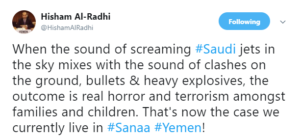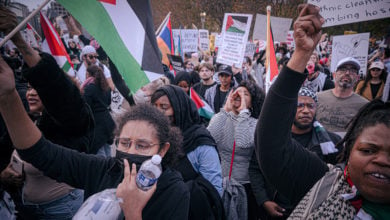Editor: On Dec. 4, shortly after this article went to press, Houthi forces reported that they have killed Ali Abdullah Saleh in an ambush as the former president was on his way the Yemeni city of Ma’rib. Houthis report they now control the capitol city of Sana’a. This is being reported by all major media sites including the New York Times. This development represents a new phase in the multi-party civil war that is racking the country and opens new dangers for further foreign intervention in the country.
The odd-couple alliance between the Houthi rebels and former Yemeni president Ali Abullah Saleh has ruptured, leading to street battles between rival armed groups in the northern capitol city of Sana’a which has been controlled by the Houthis with support from Saleh since 2015.
The alliance has been crumbling since August, leading to street battles last week that left 14 dead on the streets of the capitol, as pro-Houthi and pro-Saleh forces battled for control of the central mosque in advance of the massive celebration of the birthday of the Prophet Muhammad. The cause of the open break between Saleh and the Houthis can be found in an olive branch Saleh extended to the Saudis on Dec. 2, in which he said he is open to talks and is ready to “turn the page” if the brutal blockade against Yemen is lifted.
The Saudis on Saturday issued a statement welcoming Saleh’s words.
On the other hand, a Houthi spokesperson called Saleh’s words “a coup against our alliance and partnership.”
The fighting in the densely populated city has struck fear into the civilian population, as workers and their families have rushed for cover to avoid the conflict in the streets.
As reported in TheNewArab: ”
“Sanaa is becoming like a ghost town. There is a street war and people are holed up in their houses,” according to a local activist who works with the International Organisation for Migration in Sanaa.
“If the confrontation continues, many families will be cut off” and stranded in their homes, he warned.
 On Dec. 3, the Saudi-led coalition bombarded Sana’a with at least 5 airstrikes. Some have claimed that these strikes are in support of pro-Saleh forces though others dispute this claim. (AlAraby)
On Dec. 3, the Saudi-led coalition bombarded Sana’a with at least 5 airstrikes. Some have claimed that these strikes are in support of pro-Saleh forces though others dispute this claim. (AlAraby)
The blockade was tightened in the beginning of November after a Houthi missile was fired towards Riyadh. In the face of international pressure from the UN and UK, Saudi Arabia has eased the blockade allowing in an aid shipment which is just a drop in the bucket of the massive need in the country According to the UN:
“Yemen remains on the cusp of one of the largest famines in modern times,” says the statement, explaining that nearly 400,000 children suffer from severe acute malnutrition and face an increased risk of death. In addition, some eight million people could starve without urgent food assistance coming into Yemen.
With 90 percent of the country’s food imported, the lack of commercial imports through Red Sea ports would alone push a further three million people into starvation. “The threat of widespread famine in a matter of months is very real,” the statement warns.
Recently, the humanitarian crisis in Yemen has gained some much deserved attention in the Western media. The images of suffering Yemeni children cannot but melt the hearts of those who have them; however the coverage fails to expose the real truth of the situation, which is that the U.S. is funding and supporting this brutal war. Now more than ever, we must call for an end to all U.S. intervention in Yemen, direct or indirect, and support the right of the Yemeni people to self-determination.





